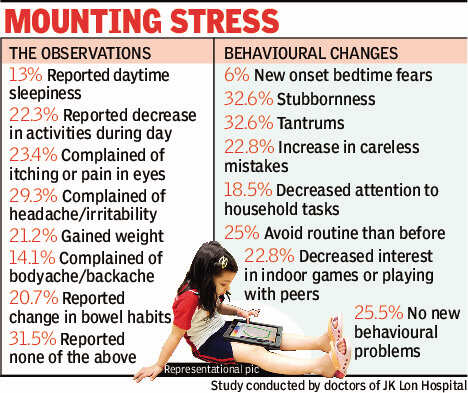
JAIPUR: Parents have expressed concerns over behavioural changes among children who now spend long hours on mobile phones, laptops, TVs and tablets following the Covid-19 lockdown.
Childen have developed symptoms like dry eyes, headaches and show conditions such as depression, anxiety, insomnia, other than having become obese.

Along with these, they exhibit behavioural changes such as bedtime fear, stubbornness, throw tantrums, make careless mistakes, have lower attention for household tasks, avoid routines than before, and show lesser interest in indoor games or playing with peers. These have been found by a study on increasing incidences of screen addiction due to online classes during the pandemic, and its association with psychiatric disorders in youth.
65% kids use mobile phones for classes
The study, conducted by JK Lon Hospital, the state’s biggest government-run child facility, has found that the use of mobile phones and laptops has increased significantly during lockdown.
The team of physicians observed that there has been a rapid increase in the average screen time of children as a result of online classes. There has been an increase in the average screen time from 2.25 hours per day, before the lockdown, to 8.30 hours per day, during the lockdown. A near three-time increase in the daily average screen time.
About 45% of the children found it difficult to sleep immediately after going to bed. It has been reported by parents that these children were earlier accustomed to sleeping immediately after going to bed. About 50% of these children did not feel sleepy even after 20 to 60 minutes in bed, while 17% woke up in the middle of their sleep, and on an average, took around 20 to 30 minutes again to get back to sleep.
The study showed that 65% of children were using mobile phones for online classes, while others used laptops and tablets. For the education provided through the online medium, up to 33% parents did not see any change in the level of interest or education of their children, whereas, 19% of the parents said that these levels were worse than before. Around 65% of the children were seen to have some addiction for their devices, which were being used by 50% of these children only recently. These kids were not able to stay away from the devices for even half an hour, the study shows.
About 6.3% of these children started waking up at night with nightmares, and stubbornness also increased to 32%. Instances of uncontrolled rage in children also increased by 30%. The study also noted an increase in carelessness, lack of attention to household tasks, routine changes such as not cleaning teeth, not taking baths on time, etc. During this time, there was also a decrease in children’s interest in playing indoor games.
“Prior to this study, there was sufficient evidence captured in studies from around the world to demonstrate that excessive use of screens resulted in blocking the neurological transmissions in the brain and affecting the physical development of these children. The present study has proved the same to be true in Indian conditions as well,” said Dr Ashok Gupta of JK Lon Hospital.
Under Dr Gupta’s guidance, the study was carried out by his colleagues at the Department of Paediatric Medicine, Dr Dhan Raj Bagri, Dr Ramesh Chaudhary, Dr Kamlesh Aggarwal and Dr Vivek Athawani.
“Kids are spending more than 7.5 hours in front of a screen, making life sedentary and increasing the risk of obesity. Motor vehicle accidents increase with use of mobile devices. Epigenetics demonstrates that environment influences genetic expression. Prolonged use of mobile phones has been found to be associated with the thinning of cerebral cortex, which causes impairment of intellectual abilities and negative effects on physical, mental and social development of paediatric population,” Dr Dhan Raj Bagri, assistant professor (pediatrics), JK Lon Hospital.
Childen have developed symptoms like dry eyes, headaches and show conditions such as depression, anxiety, insomnia, other than having become obese.

Along with these, they exhibit behavioural changes such as bedtime fear, stubbornness, throw tantrums, make careless mistakes, have lower attention for household tasks, avoid routines than before, and show lesser interest in indoor games or playing with peers. These have been found by a study on increasing incidences of screen addiction due to online classes during the pandemic, and its association with psychiatric disorders in youth.
65% kids use mobile phones for classes
The study, conducted by JK Lon Hospital, the state’s biggest government-run child facility, has found that the use of mobile phones and laptops has increased significantly during lockdown.
The team of physicians observed that there has been a rapid increase in the average screen time of children as a result of online classes. There has been an increase in the average screen time from 2.25 hours per day, before the lockdown, to 8.30 hours per day, during the lockdown. A near three-time increase in the daily average screen time.
About 45% of the children found it difficult to sleep immediately after going to bed. It has been reported by parents that these children were earlier accustomed to sleeping immediately after going to bed. About 50% of these children did not feel sleepy even after 20 to 60 minutes in bed, while 17% woke up in the middle of their sleep, and on an average, took around 20 to 30 minutes again to get back to sleep.
The study showed that 65% of children were using mobile phones for online classes, while others used laptops and tablets. For the education provided through the online medium, up to 33% parents did not see any change in the level of interest or education of their children, whereas, 19% of the parents said that these levels were worse than before. Around 65% of the children were seen to have some addiction for their devices, which were being used by 50% of these children only recently. These kids were not able to stay away from the devices for even half an hour, the study shows.
About 6.3% of these children started waking up at night with nightmares, and stubbornness also increased to 32%. Instances of uncontrolled rage in children also increased by 30%. The study also noted an increase in carelessness, lack of attention to household tasks, routine changes such as not cleaning teeth, not taking baths on time, etc. During this time, there was also a decrease in children’s interest in playing indoor games.
“Prior to this study, there was sufficient evidence captured in studies from around the world to demonstrate that excessive use of screens resulted in blocking the neurological transmissions in the brain and affecting the physical development of these children. The present study has proved the same to be true in Indian conditions as well,” said Dr Ashok Gupta of JK Lon Hospital.
Under Dr Gupta’s guidance, the study was carried out by his colleagues at the Department of Paediatric Medicine, Dr Dhan Raj Bagri, Dr Ramesh Chaudhary, Dr Kamlesh Aggarwal and Dr Vivek Athawani.
“Kids are spending more than 7.5 hours in front of a screen, making life sedentary and increasing the risk of obesity. Motor vehicle accidents increase with use of mobile devices. Epigenetics demonstrates that environment influences genetic expression. Prolonged use of mobile phones has been found to be associated with the thinning of cerebral cortex, which causes impairment of intellectual abilities and negative effects on physical, mental and social development of paediatric population,” Dr Dhan Raj Bagri, assistant professor (pediatrics), JK Lon Hospital.

Coronavirus outbreak
Trending Topics
LATEST VIDEOS
City
 Shocking: Teen in UP given electric shocks, burned with molten wax over suspicion of theft
Shocking: Teen in UP given electric shocks, burned with molten wax over suspicion of theft  Most curbs go, devotees offer prayers at temples, mosques, gurdwaras in corona-hit Bhopal
Most curbs go, devotees offer prayers at temples, mosques, gurdwaras in corona-hit Bhopal  Gujarat: Surat teacher depicts Covid-19 crisis through his art work
Gujarat: Surat teacher depicts Covid-19 crisis through his art work  Pune: Riverside road from Bhide bridge towards Erandwane closed for traffic again
Pune: Riverside road from Bhide bridge towards Erandwane closed for traffic again
More from TOI
Navbharat Times
Featured Today in Travel
Quick Links
Kerala Coronavirus Helpline NumberHaryana Coronavirus Helpline NumberUP Coronavirus Helpline NumberBareilly NewsBhopal NewsCoronavirus in DelhiCoronavirus in HyderabadCoronavirus in IndiaCoronavirus symptomsCoronavirusRajasthan Coronavirus Helpline NumberAditya ThackerayShiv SenaFire in MumbaiAP Coronavirus Helpline NumberArvind KejriwalJammu Kashmir Coronavirus Helpline NumberSrinagar encounter
Get the app





